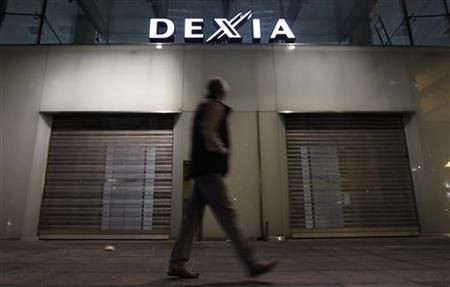Troubled Franco-Belgian Dexia Bank Gets Another Huge Bailout

The troubled French-Belgian bank Dexia Group will be the recipient of a huge bailout from a consortium of European and Arab sources.
The bank, whose shares had plunged 42 percent last week, was poised to go bankrupt, a fatality of the Eurozone crisis.
However, under terms of a bailout package, the government of Belgium will purchase Dexia’s Belgian operations for 4 billion euros ($5.42 billion).
The Belgian unit comprises a retail operation with 6,000 workers, and deposits totaling 80 billion euros ($108.5 billion) for 4 million customers.
Moreover, Luc Frieden, the finance minister of Luxembourg, announced that an investment group from Qatar in the Middle East will acquire Dexia’s Luxembourg unit, BIL.
The French government will take control of Dexia’s municipal finance business in France. Dexia is also expected to sell off its profitable Turkish unit, Denizbank.
In addition, Dexia said it has received state guarantees of up to 90 billion euros ($122.1 billion) to secure borrowing over the next ten years. Of those guarantees, Belgium will provide 60.5, France, 36.5 percent and Luxembourg, 3 percent.
Dexia, which was originally formed in 1996 through the merger of France’s and Belgium's biggest municipal lenders, now finds itself mired in Greece’s debt disaster. According to reports, the bank has 3.4 billion euros ($4.5 billion) of exposure to Greece’s government bonds; and an estimated additional 17.5 billion euros ($23.7 billion) of exposure to the sovereign debt of Italy, Spain, Portugal and other distressed Eurozone economies.
"We found an agreement on the fair division of the costs related to the management of the… bank,” Belgian Prime Minister Yves Leterme told a news conference early Monday.
The bailout pact came shortly after the two most powerful political leaders of Europe, Chancellor Angela Merkel of German and French President Nicolas Sarkozy, vowed to recapitalize weakened European banks.
This will represent Dexia’s second bailout – in 2008, the governments of Belgium, France and Luxembourg provided 6.4 billion euros ($8.7 billion) to keep the bank solvent. That scenario occurred after Dexia has likely expanded too much by acquiring other banks around the world. The bank’s U.S. asset management and bond insurance unit, FSA, was victimized by the subprime mortgage crisis in the U.S. and incurred heavy losses.
Robert Peston, the business editor at BBC News, commented on his blog: “The near collapse of the Franco-Belgian bank Dexia is the event that focused the minds of Eurozone leaders on the urgency of putting in place a comprehensive plan to strengthen European banks in general.”
Peston indicated that given Dexia’s size -- it has a balance sheet of more than 500 billion euros ($678 billion) – its rescue was vital to spare Europe more financial turmoil.
© Copyright IBTimes 2025. All rights reserved.





















